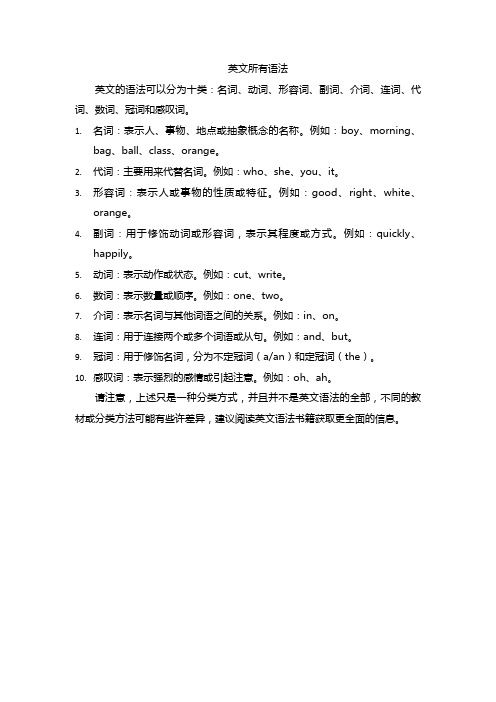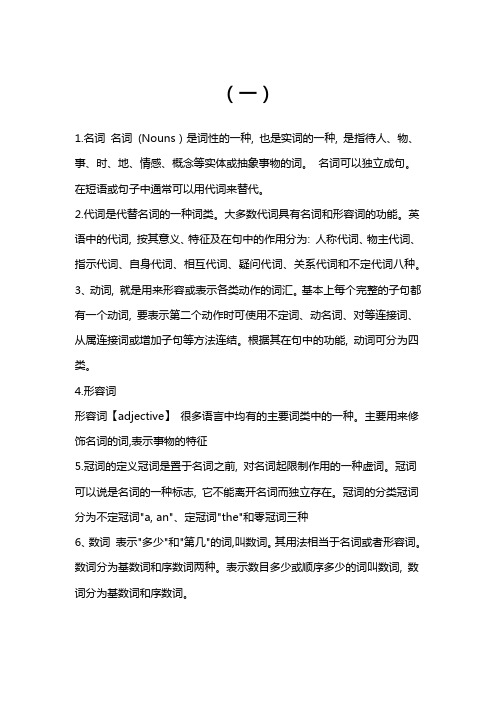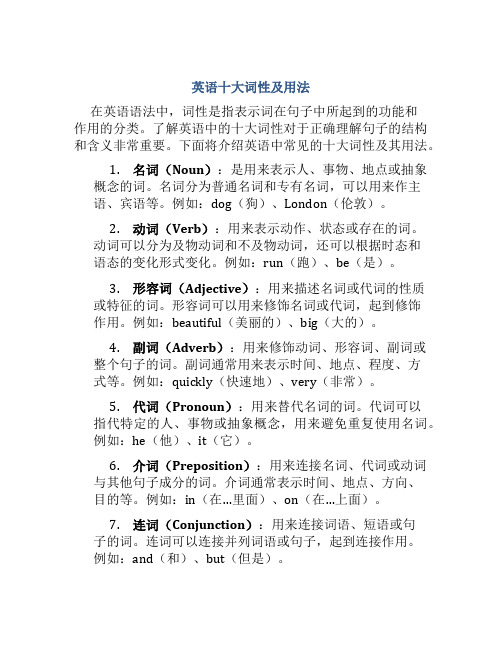英语中各类词的用法
英文所有语法

英文所有语法
英文的语法可以分为十类:名词、动词、形容词、副词、介词、连词、代词、数词、冠词和感叹词。
1.名词:表示人、事物、地点或抽象概念的名称。
例如:boy、morning、
bag、ball、class、orange。
2.代词:主要用来代替名词。
例如:who、she、you、it。
3.形容词:表示人或事物的性质或特征。
例如:good、right、white、
orange。
4.副词:用于修饰动词或形容词,表示其程度或方式。
例如:quickly、
happily。
5.动词:表示动作或状态。
例如:cut、write。
6.数词:表示数量或顺序。
例如:one、two。
7.介词:表示名词与其他词语之间的关系。
例如:in、on。
8.连词:用于连接两个或多个词语或从句。
例如:and、but。
9.冠词:用于修饰名词,分为不定冠词(a/an)和定冠词(the)。
10.感叹词:表示强烈的感情或引起注意。
例如:oh、ah。
请注意,上述只是一种分类方式,并且并不是英文语法的全部,不同的教材或分类方法可能有些许差异,建议阅读英文语法书籍获取更全面的信息。
英语各种词性的用法是什么

容词。
2)有些以 -ly 结尾既为形容词,也为副词。
daily,weekly,monthly,yearly,early
The Times is a daily paper.
The Times is published daily.
用形容词表示类别和整体
某些形容词加上定冠词可以泛指一类人, 与谓语动词的复数连接。 如:the dea数词代表分母。分子大于 1 时,分子的序数词用单
数,分母序数词用复数: 1/3 one-third ; 3/37 three and three-sevenths
形容词的用法
以-ly 结尾的形容词
1)friendly, deadly,lovely,lonely,likely,lively, ugly,brotherly,仍为形
the living,the rich, the poor,the blind,the hungry
多个形容词修饰名词的顺序
限定词 --数词 --描绘词 --(大小,长短,形状,新旧,颜色 ) --出处 --材料性质,类 别 -- 名词 a small round table; a tall gray building;a dirty old brown shirt;a famous German medical school 副词的用法 方式副词 能够表达出某人完成某事的方式,它最常与行为动词搭配使用。方式副词包括: slowly(慢慢地)、 fast(迅速地)、 carefully(小心地)、 carelessly(粗心地)、 effortlessly(不费力地)、 urgently(急切地)。 方式副词可以放在句末,或者直接放在动词后。 时间与频率副词
英语各种词性的用法是什么 在英语中,词汇有很多种词性,各个词性有相对应的名称及缩写,包括名 词、动词、形容词、副词、助动词、连接词、冠词、代词等等。 名词的用法 名词复数 1)可数名词结尾加 s/es 2)特殊单词单复数同形,如 sheep,fish,Chinese 3)特殊单词复数不规则变化,如 foot-feet, woman-women,tooth-teeth 4)集体名词,以单数形式出现,但实为复数,如 people, police 名词所有格 1) 单数名词词尾加“‘ s”,复数名词词尾没有 s,也要加“’ s”,如 the boy ‘s bag 男孩的书包, men’s room 男厕所。 2) 若名词已有复数词尾 -s ,只加“‘”,如: the workers’ struggle工人的 斗争。 3) 凡不能加“‘ s”的名词,都可以用“名词 +of +名词”的结构来表示所有关 系,如: the title of the song歌的名字。 代词的用法 代词分为人称代词、物主代词、指示代词、反身代词、相互代词、疑问代词、 关系代词、连接代词和不定代词九种 动词的用法 连系动词类 ①变化类 : become, get, turn, grow, make,
英语中的用法

要想学好英语,掌握各种词性的用法及其位置显得非常重要。
英语有十大词性,分为实词和虚词两类,其用法和位置且听我一一道来。
一、名词名词是用来表示人和事物名称的,是实词,具体用法和位置如下:1、用作主语例句:Time is money.(时间就是金钱。
)名词time在句中作主语。
2、用作宾语例句:People should save water.(人们应该节约用水。
)名词water在句中作宾语。
3、用作补语例句:Broad experience has made me a useful man.(广博的阅历使我成为一个有用的人。
)名词man在句中作补语。
4、用作表语例句:Knowledge is power.(知识就是力量。
)名词power在句中作表语。
5、用作同位语例句:Jack,a clever boy,is my best friend.(Jack,一位聪明的男孩,是我最好的朋友。
)名词短语a clever boy在句中作同位语。
6、用作定语例句:There are ten boy students in our class.(在我们班里有十名男同学。
)名词boy在句中作定语。
7、用作状语例句:They are going to see a film this evening.(他们打算今天晚上去看电影。
)名词短语this evening在句中作状语。
8、用作称呼语例句:May I come in,sir?(先生,我可以进来吗?)名词sir在句中作称呼语。
二、代词代词是用来代替名词的一种实词,代词细分为九种,具体用法不同。
1、人称代词:主格作主语;宾格作宾语;人称代词作表语时,多用宾格。
例句:They want her to go to school.(他们想要她去上学。
)人称代词they(主格)在句中作主语,人称代词her(宾格)在句中作宾语。
2、物主代词:形容词性物主代词只能作定语,后面必须跟名词;名词性物主代词可以作主语、宾语和表语等,后面不能跟名词。
英语单词用法规则

英语单词用法规则一、名词(n.)1. 可数名词复数形式。
- 一般情况在词尾加 -s,如:book[bʊk](单数) - books[bʊks](复数)。
- 以s, x, ch, sh结尾的名词,加 -es,如:box[bɒks] - boxes[bɒksɪz]。
- 以辅音字母 + y结尾的名词,变y为i,再加 -es,如:city[ˈsɪti] - cities[ˈsɪtiz]。
- 以f或fe结尾的名词,有些变f或fe为v,再加 -es,如:leaf[liːf] - leaves[liːvz]。
2. 名词所有格。
- 有生命的名词所有格,一般在名词后加's,如:Tom's book。
如果名词复数以-s结尾,只加',如:students' books。
- 无生命的名词所有格常用“of + 名词”结构,如:the window of the room。
二、动词(v.)1. 一般现在时第三人称单数形式。
- 一般情况在词尾加 -s,如:like[laɪk] - likes[laɪks]。
- 以s, x, ch, sh, o结尾的动词,加 -es,如:go[gəʊ] - goes[gəʊz],watch[wɒtʃ] - watches[wɒtʃɪz]。
- 以辅音字母 + y结尾的动词,变y为i,再加 -es,如:study[ˈstʌdi] - studies[ˈstʌdiz]。
2. 动词的过去式和过去分词。
- 规则变化。
- 一般情况在词尾加 -ed,如:work[wɜːk] - worked[wɜːkt]。
- 以e结尾的动词加 -d,如:live[lɪv] - lived[lɪvd]。
- 以“辅音字母 + y”结尾的动词,变y为i,再加 -ed,如:cry[kraɪ] - cried[kraɪd]。
- 重读闭音节且末尾只有一个辅音字母的动词,双写这个辅音字母,再加 -ed,如:stop[stɒp] - stopped[stɒpt]。
英语之中名词、代词、动词、形容词、冠词、数词、副词、介词、连词、感叹词

(一)1.名词名词(Nouns)是词性的一种, 也是实词的一种, 是指待人、物、事、时、地、情感、概念等实体或抽象事物的词。
名词可以独立成句。
在短语或句子中通常可以用代词来替代。
2.代词是代替名词的一种词类。
大多数代词具有名词和形容词的功能。
英语中的代词, 按其意义、特征及在句中的作用分为: 人称代词、物主代词、指示代词、自身代词、相互代词、疑问代词、关系代词和不定代词八种。
3、动词, 就是用来形容或表示各类动作的词汇。
基本上每个完整的子句都有一个动词, 要表示第二个动作时可使用不定词、动名词、对等连接词、从属连接词或增加子句等方法连结。
根据其在句中的功能, 动词可分为四类。
4.形容词形容词【adjective】很多语言中均有的主要词类中的一种。
主要用来修饰名词的词,表示事物的特征5.冠词的定义冠词是置于名词之前, 对名词起限制作用的一种虚词。
冠词可以说是名词的一种标志, 它不能离开名词而独立存在。
冠词的分类冠词分为不定冠词"a, an"、定冠词"the"和零冠词三种6、数词表示"多少"和"第几"的词,叫数词。
其用法相当于名词或者形容词。
数词分为基数词和序数词两种。
表示数目多少或顺序多少的词叫数词, 数词分为基数词和序数词。
7、副词(Adverb)副词的定义: 副词是一种用来修饰动词,形容词,副词或全句的词,说明时间,地点,程度,方式等概念。
8、介词的定义和特征介词是一种用来表示词与词, 词与句之间的关系的词。
在句中不能单独作句字成分。
介词后面一般有名词代词或相当于名词的其他词类, 短语或从句作它的宾语。
(二)1.名词, 人或事物的名称3.代词, 代替名词或者数词(比如some就是代替数目)3.动词, 动作或状态4.数词, 表示数目或顺序(比如序数词, 5th就是表示顺序)5.形容词, 人或事物的性质或状态(因为形容词一般修饰名词)6.副词, 动作的特征或性状特征(因为副词一般修饰动词或形容词)7、冠词, 表示名词的泛指或特指8、介词, 表示名词或代词与其他词的关系(因为介词后面一半紧跟名词, 代词或其他名词性结构)9、连词, 连接词与词, 短语与短语, 句子与句子10、感叹词, 表示说话时的感情或语气(三)1.adj./ a.形容词用来描述一类物质的性质,状态,外貌,或人的性格特点,性质,品格如:big,happy2.adv./ ad.副词用来修饰动作或形容词,一般在句子中做状语用表示动作的进行怎样,或表示程度,特点,如:clearly,happily3.prep.介词连接地点,时间的一类词语,可以表示方位,时间.跟一些表示时间,地点的词连用表示介词词组如:in,to,on,under4.conj.连词用来连接时间,地点,原因,结果的一类词语如:when,beacuse,so5.num.数词表示数字的词,既可以是基数词,也可以是序数词如:one,two,first6.int.感叹词表示感叹的一类词,一般不加一解释,只代表感叹如:what,how,haurray7、vt.及物动词(后面要加宾语)行为动作的词如:do,finish,play8、vi.不及物动词(后面不加宾语)表示行为动作的词如:appear9、n.名词表示物体,物质的词如:pig,cow,man10、pron.代词代指一类人,事或物的词如:he,she,hers,his,things11.art = 冠词, article的缩写(四)在英语语法中主要把词分为8大类:1. 名词: 表示人、物或地方等, 如: John, teacher;table, pen;London;beauty.2. 代词: 用来代替名词, 以避免重复某个名词, 如: I, you, it, that, those, them.3.形容词:用来修饰或限制某个(些)名词, 如:good(man), white (paper), every(book), much(water), (John is)hon-est, (He seems)lazy.被修饰或限制的名词, 叫做主体词(head-word)。
英语单词用法

1.individuals,characters, folks替换(people ,persons)2: positive, favorable, rosy (美好的),promising (有希望的),perfect, pleasurable , excellent, outstanding, superior替换good3:dreadful, unfavorable, poor, adverse, ill (有害的)替换bad如果bad做表语,可以有be less impressive替换eg.An army of college students indulge themselves in playing games, enjoying romance withgirls/boys or killing time passively in their dorms. When it approaches to graduation ,as a result, they find their academic records are less impressive.4.(an army of, an ocean of, a sea of, a multitude of ,a host of, many, if not most)替换many. 注:用many, if not most 一定要小心,many后一定要有词。
Eg. Many individuals, if not most, harbor the idea that….同理用most, if not all ,替换most. 5: a slice of, quiet a few , several替换some6:harbor the idea that, take the attitude that, hold the view that, it is widely shared that, it is universally acknowledged that)替think (因为是书面语,所以要加that)7:affair ,business ,matter 替换thing8: shared 代 common9.reap huge fruits 替换get many benefits )10:for my part ,from my own perspective 替换 in my opinion11:Increasing(ly),growing 替换more and more( 注意没有growingly这种形式。
英语词性分类及用法

oc = 受词补语 宾语补语 vi = 不及物动词,intransitive verb的 缩写 vt = 及物动词,transitive verb的缩写 aux.v = 助动词 ,auxiliary的缩写 a = 形容词,adjective的缩写 ad = 副词,adverb的缩写 art = 冠词,article的缩写 num = 数词,numeral的缩写
冠词:是一种不能单独使用的虚词,只能 依附在一个名词上,帮助说明这个名词 的含义
名词:是表示人,事物,地点或者抽象概念 的名称的词
代词:代词就是代替名词的词
数词:数词分为基数次和序数词,基数词 表示人或者事物的数量,序数词表示人 物或者事物的次序
形容词:用于修饰名词或者代词,表示人 或事物的性质和特征
普通名词又可分为下面四类:
1)个体名词:表示某类人或东西中的个体,如:gun 2)集体名词:表示若干个个体组成的集合体,如:family
(以上两类属于可数名词) 3)物质名词:表示无法分为个体的实物,如:air 4)抽象名词:表示动作、状态、品质、感情等抽象概 念,如:work
(以上两类属于不可数名词)
3. 成语介词 (约有500个)如:out of,apart from,because of, by means of等。
按意义英语介词可分为3类:
1. 时间介词, 如:at, on, in, during, over, from, for, until等。 2. 地点介词, 如:at, on, in, across, to, over, between, inside, 3. 其它介词,如:by, with, about, except, instead of, due to,
英语十大词性及用法

英语十大词性及用法在英语语法中,词性是指表示词在句子中所起到的功能和作用的分类。
了解英语中的十大词性对于正确理解句子的结构和含义非常重要。
下面将介绍英语中常见的十大词性及其用法。
1.名词(Noun):是用来表示人、事物、地点或抽象概念的词。
名词分为普通名词和专有名词,可以用来作主语、宾语等。
例如:dog(狗)、London(伦敦)。
2.动词(Verb):用来表示动作、状态或存在的词。
动词可以分为及物动词和不及物动词,还可以根据时态和语态的变化形式变化。
例如:run(跑)、be(是)。
3.形容词(Adjective):用来描述名词或代词的性质或特征的词。
形容词可以用来修饰名词或代词,起到修饰作用。
例如:beautiful(美丽的)、big(大的)。
4.副词(Adverb):用来修饰动词、形容词、副词或整个句子的词。
副词通常用来表示时间、地点、程度、方式等。
例如:quickly(快速地)、very(非常)。
5.代词(Pronoun):用来替代名词的词。
代词可以指代特定的人、事物或抽象概念,用来避免重复使用名词。
例如:he(他)、it(它)。
6.介词(Preposition):用来连接名词、代词或动词与其他句子成分的词。
介词通常表示时间、地点、方向、目的等。
例如:in(在…里面)、on(在…上面)。
7.连词(Conjunction):用来连接词语、短语或句子的词。
连词可以连接并列词语或句子,起到连接作用。
例如:and(和)、but(但是)。
8.冠词(Article):用来限定名词的词。
有定冠词“the”和不定冠词“a”、“an”。
冠词用来表示名词的特指和泛指。
例如:the book(那本书)、a cat(一只猫)。
9.数词(Numeral):用来表示数目、顺序或序数的词。
数词可以分为基数词和序数词,用来表示数量和顺序关系。
例如:three(三)、first(第一)。
10.感叹词(Interjection):用来表示情感、感叹或呼唤的词。
- 1、下载文档前请自行甄别文档内容的完整性,平台不提供额外的编辑、内容补充、找答案等附加服务。
- 2、"仅部分预览"的文档,不可在线预览部分如存在完整性等问题,可反馈申请退款(可完整预览的文档不适用该条件!)。
- 3、如文档侵犯您的权益,请联系客服反馈,我们会尽快为您处理(人工客服工作时间:9:00-18:30)。
英语中各种词的用法介词是一种用来表示词与词, 词与句之间的关系的词。
在句中不能单独作句字成分。
介词后面一般有名词代词或相当于名词的其他词类,短语或从句作它的宾语。
介词和它的宾语构成介词词组,在句中作主语, 状语,表语,补语或介词宾语。
例如:Most of the students went to the classroom.大部分学生去了教室。
We play basketball on the sports ground.我们在操场上打蓝球。
介词常与动词,形容词,名词一起构成固定搭配。
belong to 属于rely on 依靠talk to 同...谈话be afraid of 害怕be strict with对...严格介词一般放在名词之前。
但它后面的介词宾语是疑问代词,疑问副词或者关系代词时,这些词提到了前面而只剩下介词在后了。
Where do you come from?你是哪儿人?Who are you talking to?你在跟谁谈话呢?What do you study for?你为了什么而学习?介词在英语词汇中所占比例很小,但它们的用法却非常灵活,复杂。
以下是一个例子:about 关于,附近,大约,周围,随身.I have bought a book about Shakespearean.我买了一本有关莎士比亚的书。
1. WITH(1)v+with(a) v+withbegin, mix, agree, deal, fight, meet, play, quarrel, do, fool, reason,correspond, comply, settle.(b) v + sth (sb) + with + sth (sb)compare, provide, supply, feed, replace, combine, equip, furnish,(2)adj+withangry, strict, pleased, busy, covered, satisfied, filled, wrong, wild, crowded, connected, popular, covered, patient, annoyed, acquainted, delighted, confronted, content, friendly, identical, frank, concerned, bored, afflicted, associated, blended, burdened, comparable, consistent, disappointed, displeased, endowed, enraged, exhausted, familiar, gifted, impatient, infested, intimate, irritated, level, moved, occupied, overcome, popular, satisfied, vexed(3) n+withacquaintance, alliance, trouble, talk, chat, connection, consultation, conversation, sympathy,2. AT(1)v+ataim, point, snatch, wonder, strike, work, look, glance, laugh, run, catch, shoot, stare, glare, thrust, smile, call, fire, tear, knock, winder, arrive, come, gasp(2)adj+atamused, delighted, angry, good, surprised, astonished, pleased, terrified, clever, alarmed, astonished, clumsy, disgusted, impatient, quick, startled, surprised(3)n+atknock, pull, look, glance, smile, game, astonishment, surprise, alarm,3. IN(1)v+inget, lie, turn, draw, believe, share, take, drop, give, call, hand, succeed, bring, result, trade, involve, check, count, cut, indulge, pour, participate, intervene, fill,join, confide, trust, believe,persist, consist,(b) V+sb(sth)+inhelp, spend(2)adj+inrich, interested, active, disappointed, engaged, busy, weak, expert, successful, absorbed, skilled, concerned, experienced, confident, employed, accurate, clothed, diligent, negligent, proficient, prompt, versed,(3)n+ininterest, progress, satisfaction, faith, belief, confidence, response, pride, perseverance, harm, difficulty,pleasure, confidence, delight,4. FROM(1)V+from(a) V + fromlearn, die, come, suffer, hear, fall, rise, hang, escape, date, depart, result, descend, refrain, abstain, differ, distinguish, derive, expel, conceal, judge(b) V + sth ( sb) +from + sth ( sb or a place)borrow, protect, receive, separate, keep, stop, prevent,deter, choose, remove, save, dissuade, excuse, restrain(2)adj+fromdifferent, far, tired, made, separate, absent, distinct, hidden, made, (3)n+fromletter, visitor,absence, difference, protection, relief, rescue,5. OF(1)V+of(a) V+ofconsist, dream, hear, tell, think, know, talk, die, speak(b) V+sb+of+sthrob, warn, inform, remind, accuse, cheat, convince, relieve, deprive, (c) V+sth+of+sbask, beg, demand, require,(2)adj+ofaware, careful, free, short, sure, certain, worthy, afraid, hopeful, proud, full, tired, made, capable, impatient, considerate, characteristic, guilty, capable, composed, jealous, ashamed, envious, ignorant, apprehensive, bare, cautious, clear, composed, conscious, descriptive, exclusive, forgetful, fond, hard, incapable, informed, innocent, made, mindful, neglectful,observant, possessed, productive, regardless, rid, sensible, sick, susceptible, weary(3) n+ofquality, number, sample, choice, impression, neglect, attack, care, consideration, pleasure, doubt, way equivalence, possibility, example,6. ON(1)v+on(a) v+onact, lean, live, work, depend, look, wait, turn, switch, pull, have,keep, call, put, push, speak, insist, push, collaborate, count, frown, reckon, speculate, figure, carry,(b) V+sb(sth)+ON+sb(sth)congratulate, spend, base, fix(2)adj+onhard, keen, dependent, based, impressed,(3)n+onbook, discussion, lecture, advice, opinion, impression, attack, dependence, judgment, pity, mercy, authority7. TO(1)v+to(a) v+tolisten, stick, refer, turn, point, reply, occur, attend, see, lead, happen, come, get, write, hold, agree, belong, adapt, attribute, object, subscribe, adjust, accede, yield, resort, relate, respond, testify, succumb,(b) v+to+sbannounce, describe, explain, express, mention, report, say, shout, suggest, whisper, speak, talk, nod,(c) v+sth(sb)+sth(sb)devote, compare, add, introduce, invite, leave, join, reduce, sentence, carry, take,(2)adj+toequal, opposed, true, familiar, close, near, kind, harmful, polite, rude, similar, useful, married, known, used, good, dedicated, fair, essential, parallel, related, sensible, relevant, possible, indifferent, devoted, comparable, necessary, contrary, suitable, strange, close, alike, opposite, familiar, inferior, superior, proportionate, accessory, accustomed, adapted, addicted, adequate, adjacent, afflicted, akin, alive, amenable, applicable, attentive, awake, blind, common, conductive, congenial, contiguous, contrary, corresponding, deaf, derogatory, disagreeable, displeasing, distasteful, exposed, false, fatal, grateful, hostile, important, indifferent, loyal, moved, obedient, odious, opposite, painful, partial, peculiar, pleasant, precious, preferable, precious, prior, profitable, prone, proper, relative, relevant, sacred, strange, subsequent, susceptible, thankful, troublesome,(3)n+tokey, answer, visitor, end, way, solution, traitor, attention, exception, gratitude, approach8. FOR(1)v+for(a)v+foraccount, beg, hope, send, look, ask, long, pay, wish, wait, leave, fight, plan, prepare, care, stand, search, answer, run, call, bargain, inquire, press, apply, provide, apologize,grieve(b)v+sb+for+sthask, blame, forgive, pardon, pay, praise, punish, reward, thank, excuse, (2)adj+foreager, bad, good, famous, fit, suitable, ready, sorry, grateful, useful, late, responsible,proper, crucial, competent, eligible, noted, renowned, appropriate, notorious, convenient, possible, profitable, liable, necessary,anxious, bound, eligible, impatient, liable, sufficient, uncared, unfit, zealous, (3)n+forplan, need, reason, explanation, ability, affection, excuse, ambition, anxiety, reputation, consideration, necessity, talent, sympathy, cause, pretext, qualification9. ABOUT(1)v+aboutquarrel, agree, consult, complain, speak, bring, think, set, care, fumble, fuss, leave, move, lie, hear,speculate, inquire,(2)adj+abouthappy, anxious, nervous, cautious, careful, certain, excited, particular, pleased, concerned, enthusiastic,uneasy, troubled(3)n+onconcern, anxiety, opinion, question.副词的用法He studies hard. 他用功读书。
